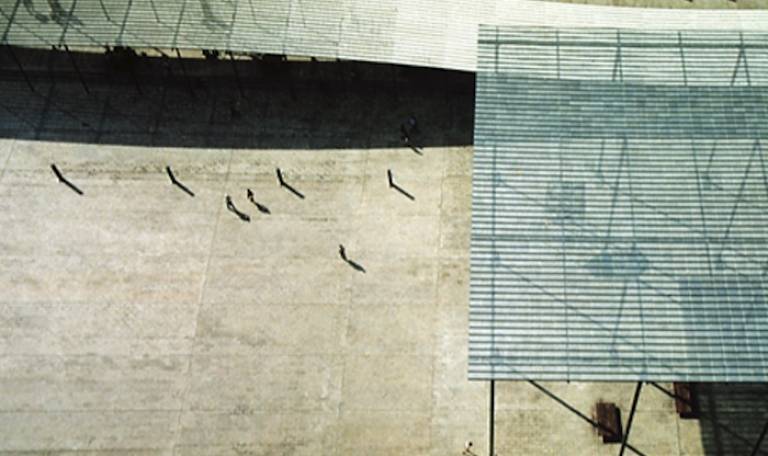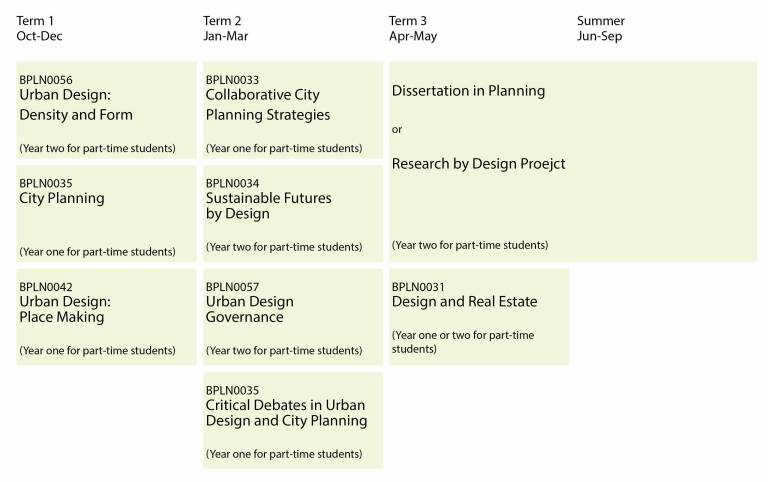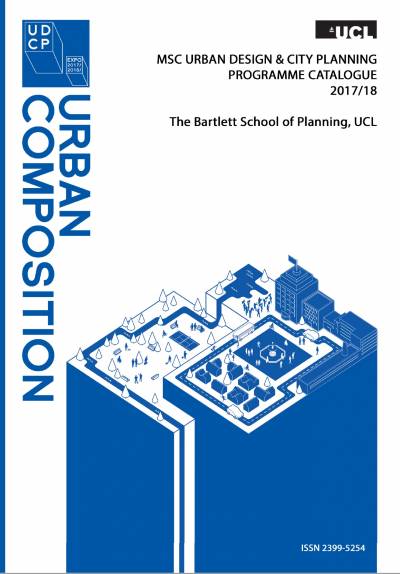The Urban Design and City Planning MSc/Dip is a unique course covering both theory and practice within urban design and city planning.

About the course
The Urban Design and City Planning MSc/Dip has a unique focus on urban design as a creative planning tool, and presents an interface between urban design and city planning, and the key dimensions of planning, real estate and sustainability.
In our course, we emphasise the importance of planning as a positive and propositional force for good, and we advocate for urban design as a discipline within which the physical shaping of places is accompanied by an equal concern for economic, social and environmental well-being.
Why choose to study urban design and city planning at The Bartlett?
We offer:
- A course with a unique focus on urban design as a creative planning tool.
- A long-term urban design research specialisation.
- An inter-disciplinary course that integrates various social science disciplines.
- An international focus, drawing on comparative studies and experiences from other European, North American and Asian countries.
Who should apply?
We welcome graduates who wish to further their professional careers to specialise in urban design and to engage deeply with both theoretical debates and practical methodologies.
Course structure
To draw on the relationship between urban design (in particular, 'urban place-making by design') and aspects of governance, real estate, and sustainability, we integrate the following areas in our students' learning:
- City planning, with a focus on spatial planning.
- Integrative thinking, with a focus on place-making (including neighbourhood scale masterplanning and open space design) and critical debates, offering students a deeper knowledge of forms, practices and theories associated with urban design.
- Delivering quality, which integrates the curricula of urban design, real estate, and sustainability.
- Planning for quality, with a focus on the understanding of the various types of urban design products and the complexity of their delivery processes, as well as the understanding and delivery of urban design tools for guidance, incentive and control.
The structure of the course is illustrated in the following diagram:

Field trips
Our course also includes a residential field trip during which themes relevant to the course are explored in different place contexts. This is an opportunity for our students to consider built environment issues in real world settings and network as a course community. The cost of travel and accommodation for the field trip are covered by UCL although students will need to cover meals and other personal expenses.
- Read more about our core modules
- Critical Debates in Urban Design
- Collaborative Planning Project
- Sustainable Futures by Design
- City Planning
- Urban Design: Place Making
- Urban Design: Density and Form
- Urban Design Governance
- Dissertation in Planning
- Design and Real Estate
More details of these modules can be found in the UCL module catalogue.
Please note that the course structure and list of modules given here is indicative. This information is published a long time in advance of enrolment and module content and availability are subject to change.
Dissertations
Examples of previous dissertation titles include:
- 'Natural disasters as cultural catalysts for city branding and tourism development: based on the case study of Tangshan'
- 'A study of academic perceptions of private management in public-private space: How have the Private Management methods of BIDs in Central London affected their public usage?'
- 'Privately owned, publically accessible space: Is there a best practice model?'
Careers and employability
Relationship to the urban design and planning practice industry
Our course draws on established links with planning and urban design practices. Each year, practitioners are invited each year to lecture, deliver seminars and workshops for the students, and supervise project work as part of several core modules and the final major research project component. Our course frequently receives input from organisations such as Urban Initiatives Studio, Terry Farrell, MacCreanor & Lavington Architects, Croydon and Camden Council, Great London Authority (GLA) – Design for London, Urban Movement, East Landscape Architects, Colin Buchanan, Urban Design Skills, Just Space Network, and others.
Employment
A number of our graduates from the course are employed in urban design, planning or in planning-related jobs, with their employers ranging from private consultancies to local authorities. An increasing proportion (over a third) of our graduates enter consultancy work, whilst others go on to work in either the development and transport sectors, the public sector, or non-profit organisations. A smaller number choose to continue higher degree studies and PhD research.
Our course strives to maintain a good connection with graduates working in urban design and planning practice in public and private offices in both the UK and abroad. Employers of graduates from The Bartlett School of Planning include: ARUP, Populous, Croydon Council, WYG Planning & Environment, Gallions Housing Association, Bioregional, Foster and Partners, Urban Initiatives and Movement, and many more.
Alumni
UCL boasts a dynamic alumni network of more than 150,000 members. In addition to the UCL network, once you graduate from the Urban Design and City Planning MSc you will have the opportunity to join The Bartlett School and Bartlett Planning's alumni networks on LinkedIn and Facebook. These platforms allow our students to stay in touch, connect with their peers and preceding graduates before, and attend events specially organised by these groups.
Staff
- Programme Director
Dr Pablo Sendra
Associate Professor in Planning and Urban Design
View Pablo's profile- Admissions Tutor
Dr Juliana Martins
Associate Professor (teaching) in Planning- Teaching staff
Elena Besussi
Teaching Fellow in Plan Making
View Elena's profileProfessor Matthew Carmona
Professor of Planning and Urban Design
View Matthew's profileColin Haylock
Visiting LecturerDr Stephen Marshall
Reader in Urban Morphology and Planning
View Stephen's profileProfessor Peter Rees
Professor of Places and City Planning
View Peter's profileDr Richard Simmons
Visiting LecturerDr Michael Short
Senior Teaching Fellow in Planning
View Michael's profileDr Filipa Wunderlich
Lecturer in Urban Design
View Filipa's profile
 Close
Close



